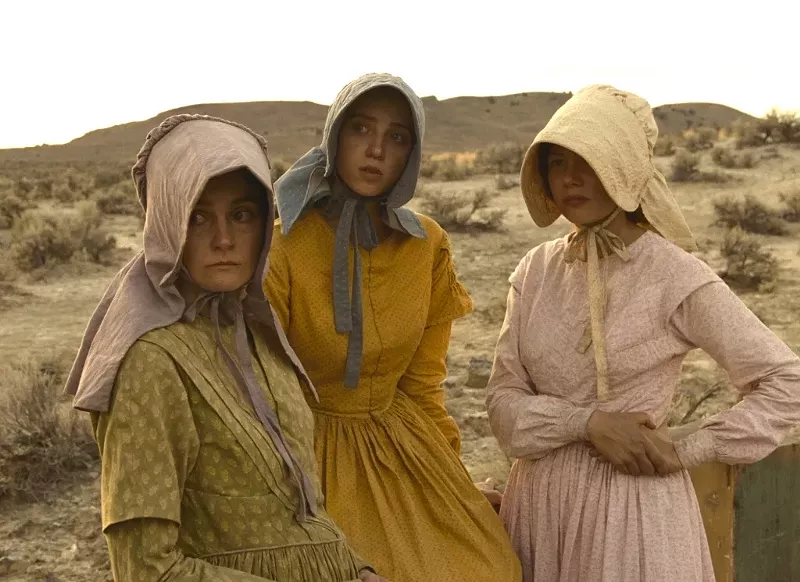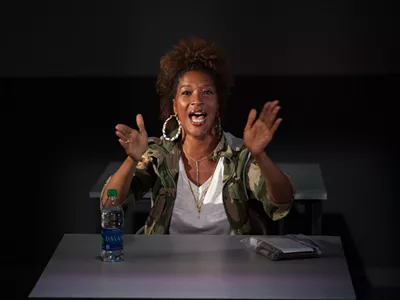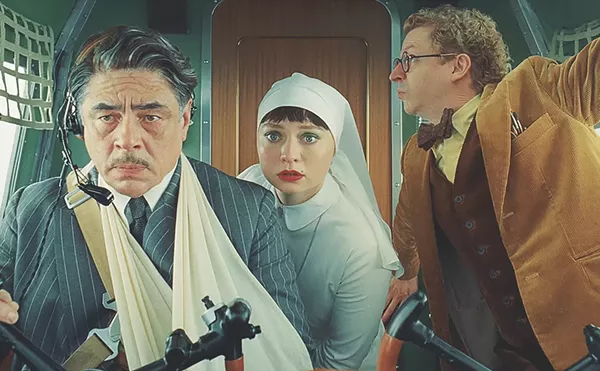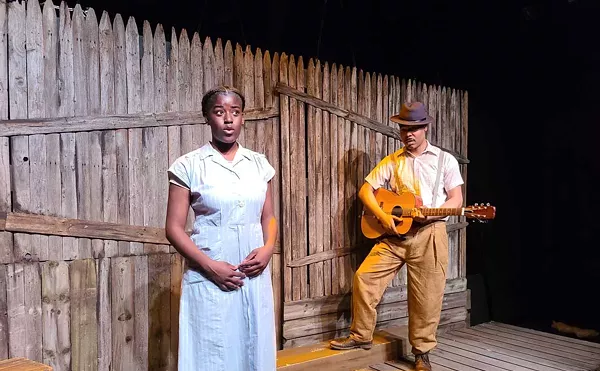Three quasi-westerns by Kelly Reichardt examine America in Cinema Lamont film series
The works screen at Hamtramck’s Oloman Cafe this month

Audio By Carbonatix
[
{
"name": "GPT - Leaderboard - Inline - Content",
"component": "35519556",
"insertPoint": "5th",
"startingPoint": "3",
"requiredCountToDisplay": "3",
"maxInsertions": 100,
"adList": [
{
"adPreset": "LeaderboardInline"
}
]
}
]

Another director-focused series is running in metro Detroit from Cinema Lamont, this time with a trio of works by Kelly Reichardt screening at Oloman Cafe. With Reichardt’s latest, quite promising work (Showing Up) due from A24 this spring, the series (spearheaded, I should say, by two friends of mine: Shawn Glinis and Josh Gardner) spotlights her most western-aligned work, which hinges upon carefully considered, largely anticlimactic treatments of the frontier and its vast web of associated myths.
Though Reichardt, who’s long specialized in modest, realist films while working out of Oregon, deals often with varieties of Americana — examining ideas of promise and aspiration, the fraught enticements of the road, and the sturdy fretwork of class structure we all spend lifetimes peering through — there’s something distinct within her body of work about this trifecta of films. Dealing (a bit obliquely) with the frontier as a kind of idealized zone connecting them all, these films seem firmly unconvinced by its attendant notions of promise, and the very notion that America provides most of us with stability or security to any appreciable degree.
First among these is 2010’s Meek’s Cutoff (screening March 7), which follows a wagon train through an arid stretch of the Oregon Trail in 1845, with a quest for fortune devolving rapidly into a desperate search for water. Following the trek undertaken in real life by the party of one Stephen Meek (here played by Bruce Greenwood), Reichardt finds in the notional cowboy a blustering scarecrow of a man, and a stand-in for the frailty of both concepts — man and cowboy — on the whole. With a tremendous Greenwood spouting self-gratifying tall tales from what seems an unending well, he presses his band in wrong directions — at least until they capture an Indigenous man who’s been observing their party (played by Rod Rondeaux).
Their captive’s presence drives a split, with Emily Tetherow (Michelle Williams, a regular Reichardt collaborator) challenging Meek’s conviction, baldly racist and founded on shaky myths, that they should execute a man who offers what might be their last, best hope of safely finding water. With Reichardt shooting the film’s dry terrain with a subdued, carefully controlled and desaturated palette, she makes evident the labor and risk of moving across it without associating these qualities with any kind of valor. Managing to be transporting while excavating the self-interest binding the film’s fractious coalition (which also includes the still-married Paul Dano and Zoe Kazan) – Reichardt finds cracks in foundational American imagery by calling attention to its roots in shaky ground.
Next in the lineup is the gentler but nevertheless transfixing Certain Women (2016), which spotlights a trio of stories set in rural Montana: a space that feels inhospitable and deeply linked to a kind of frontier imaginary despite no longer quite meriting the name. Opening on a segment led by Laura Dern, playing a lawyer in the small and finely realized town, the film sees her work to calm a disgruntled client, Will (Jared Harris). With Will reluctant to heed her persistent advice, the film treats the tension between them with an air of straight, equitably apportioned sympathy and formal practicality, while still easily attending to the way gender structures Dern’s character’s interactions and experience of the day-to-day. With strip malls and broad landscapes alike appearing in a shared, compressed autumnal palette, the distant mountain scenery falls from any level approaching spectacle to the plainer space of backdrop: a dim adornment to an unremarkable, often trying stretch of life.
Something of this same desultory air carries through the film, which continually treats its western accouterments with an air of quiet subversion: not fully emptied out but falling short of providing any kind of lasting salve. Observing Gina (Michelle Williams again) and Ryan (James Le Gros) as a young-ish couple building a home while staying in a tent, the film observes the dynamics of their small family amidst the tense, laborious process of constructing a certain kind of life. With the erection of homes long serving as a centerpiece of rural and frontier films (see also Jacques Tourneur’s Canyon Passage, Peter Weir’s Witness), the process portends a kind of speculative future – but one here that remains intimate in scale rather than suggesting any broader, dreamy strain of promise.
The last stretch follows Lily Gladstone as Jamie, a young local rancher who spends her wintry days tending to land and horses in the snow. Her existence, though, is one of solitude rather than of community, giving rise to the particular strain of curiosity boredom engenders so well. Following a crowd on a whim into a night class taught by a young lawyer named Beth (Kristen Stewart in one of her best performances), Jamie develops a shy, both romanticized and genuinely romantic attachment to Stewart as a kind of hope, forming a tenuous connection on terms that escape her firm grasp. Dealing with desire and its array of repercussions, the segment makes space for the role of class and aspiration in shaping or halting possible connection, without being so bold as to make any declarations of their definite effect.
Concluding the series is 2019’s First Cow, Reichardt’s last film to enjoy a wide, albeit pandemic-hobbled release. With a frame narrative whose roots in the present allow for an overtly meditative, historically conscious structure, the film’s main body situates itself in what’s now Oregon, in an 1820 moment in which the first non-Indigenous communities were little more than trading posts, furnishing settlers with the barest forms of infrastructure as they slowly trickled in.
With the film’s small world populated with older and recent immigrants scrabbling for purchase before any sort of “boom” could hit the area, First Cow centers “Cookie,” a traveling cook (played by John Magaro) and King-Lu (Orion Lee), a Chinese immigrant in hiding after allegations of a violent crime. Through coming together and eeking out a living baking treats — biscuits, “oily cakes,” and other baked goods — in a place lacking formal bakeries, the pair become small-scale entrepreneurs, enjoying a newfound sense of geographically settled and financial stability.
Before long, though, a man known as the Chief Factor (Toby Jones) arrives in town, constructing a more elaborate estate that enlarges and reshapes First Cow’s economic world. With this property come the titular cow and prized buckets of fresh milk, stirring in the film’s leads new embers of competitive aspiration. Framing the opportunities available on First Cow’s frontier as anything but equal, the film provides through touching, comic observation a portrait of America writ small. Grasping the textures and tensions accompanying precarity with a sense of haunting precision, First Cow demonstrates as well as any of her work that Reichardt knows exactly where we live.
Tickets, full schedule, and more information about the event can be found cinemalamont.com.
Coming soon: Metro Times Daily newsletter. We’ll send you a handful of interesting Detroit stories every morning. Subscribe now to not miss a thing.
Follow us: Google News | NewsBreak | Reddit | Instagram | Facebook | Twitter





